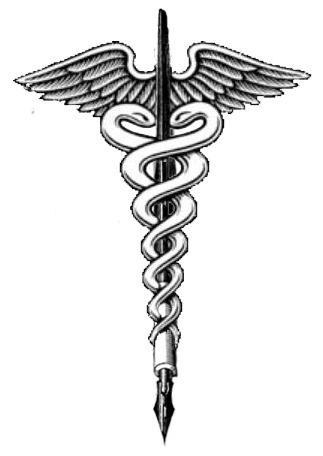|
I Don't Know
by Miya Bernson
"Ms. A." died recently. She was the first patient I helped care for who died.
When she first came in as a "stat trauma," after being run over by a truck, she was a nearly ninety-year-old lady in terrible pain, but I thought she was lucky. She had no damage to her internal organs or to her brain or spinal cord. Her leg was broken, and she had some other bruises, but that was it. As I helped the trauma team in whatever small ways I could, mainly by trying to stay out of the way of people who could actually help her, I saw something glitter on the floor. It was a gold brooch with a purple stone — I remember thinking that, when this was all over, she would be sad to lose it, and I put it on the table with her other things. She was wearing heavy gold earrings, gold necklaces, and a gold ring with turquoise blue stones. She was at the age when wearing all that jewelry looked natural rather than gaudy — a lifetime of accumulated precious mementos.
Ms. A. was from one of the ethnic groups that have immigrated in large numbers to Boston to form tight-knit communities, and she spoke very little English. Once the shock of the trauma was over and her leg had been fixed, she lay in her hospital bed moaning in pain, both the pain of her injuries and the pain of not being able to tell anyone about it. I tried to communicate with her through gestures and the few words she knew, and she would point to her right thigh, but eventually she just responded to my questions by shaking her head despondently and repeating "I don't know, I don't know." I sat with her for a while, waiting for the interpreter, but eventually had to move on to other patients.
What I didn't realize then was that the extent of the injuries to her legs made them unable to heal. The tissue began to die. The only hope of saving her life was an above-the-knee amputation. Even that operation carried a poor chance of survival, but the surgeons said they had done it successfully tp much sicker patients. She would never walk again, but she would be alive. But before her leg surgery, even before she truly realized the choice she was making, she managed to communicate to someone, "I would rather die than have an amputation."
The family chose to respect her wishes, and made her status CMO — "comfort measures only." We stopped giving antibiotics and all the other interventions. Once she was CMO but still alive, we stopped recording her vital signs and fluid intake/output for our team rounds, leaving a big blank space on our daily worksheets. We avoided her room when we rounded on patients. No one chooses to come face to face with the dying process when they don't have to, and there was little left that we could do for her. But more bothersome to the doctors was that Ms. A's decision flew in the face of what I've perceived in the weeks of my rotation as the ethos of surgery: we're here because if someone has a problem we can fix it. More than other fields of medicine, surgical solutions have a component of immediacy and satisfaction. Once the decision is made to send someone to the OR, life-saving change can happen within a matter of hours or even minutes. The cancer in the colon is removed. The terrible heartburn is fixed with an ingenious re-structuring of the stomach and lower esophagus. The fetus in distress becomes a baby with a chance, after a c-section has slipped the baby out of its mother. And when our team was talking about Ms. A, the members of my team acknowledged the odds and the tough recovery she would face, but kept emphasizing, "We've saved people who are much sicker." With the potential for a solution within reach, it was a slap in the face to not even be allowed to try. We accepted the family's decision, of course, but it was hard to walk each day by the room where an old lady was slipping more and more into the oblivion of morphine.
I wasn't there, but I'm sure she passed peacefully, the drug taking away her hunger for air as it took away the pain. The intern and I were called to pronounce her. She was the first person in the hospital I had interacted with in life and then seen in death. As the intern felt her neck for the carotid pulse, the last of the pulses to disappear, I held her wrist and felt for the radial pulse. The carotid pulse was gone, so it would have been impossible for the radial to remain. But I swear I felt a heartbeat, and I think it was my own, the blood pulsing in my living fingertips as they rested against her dead skin.
What do I think and feel about the first death I have witnessed in the hospital? The answer is: I don't know. I don't know the language or the culture. Along with my attending, I wonder whether anything should have been done, whether more life would have ultimately been worth it for her, even without a leg. I grieve with the family that such a senseless accident that initially seemed survivable would end in death. And with the necessary practicality of hospital medicine, I pause for a moment by her bedside to say goodbye to the woman with the pain and the frustration and the gold jewelry, and then I move on to tend to the living.
---
Miya Bernson-Leung is a graduate of the Harvard Medical School Class of 2010, beginning her residency in pediatrics and specializing in child neurology.
|
